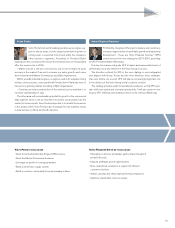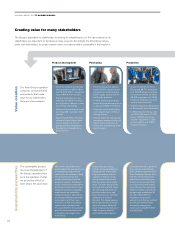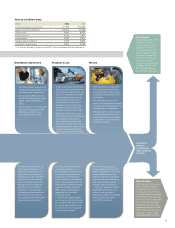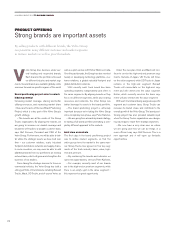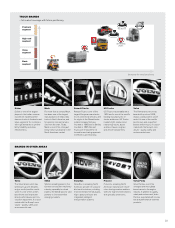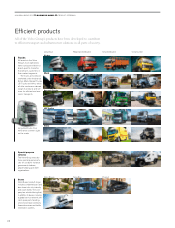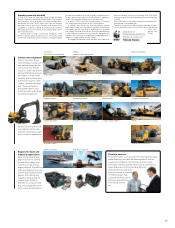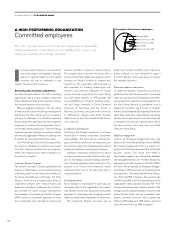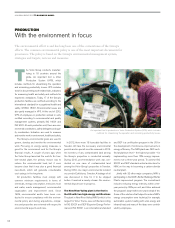Volvo 2012 Annual Report Download - page 33
Download and view the complete annual report
Please find page 33 of the 2012 Volvo annual report below. You can navigate through the pages in the report by either clicking on the pages listed below, or by using the keyword search tool below to find specific information within the annual report.
Fuel costs represent between 25% and 35% of total haulage firm costs.
At the same time, the hauliers' profit margins are often very small, which
means that all savings make an important difference. In order to succeed
in cutting the haulage firm's overall fuel consumption, the part played by
the drivers is vital. Driver training courses in eco-driving have proven them-
selves to be effective, but without professional follow-up the results are
often short-term. That is why the Volvo Group’s various businesses offer
extensive services in this area. Some of them are described below.
Volvo Trucks Fuel Advice
Volvo Trucks’ new Fuel Advice is a personal fuel advisor whose aim is to help
hauliers cut their fuel costs while at the same time maintaining these
improvements in the long-term perspective. The results are long-term, with
savings as high as 5%.
Fuel Advice consist of three modules:
1) Fuel Coaching. The fuel advisors register and analyze each driver's indi-
vidual driving techniques. The advisors provide practical tips on how fuel
consumption can be reduced, as well as help with planning and with
structuring the necessary follow-up.
2) Fuel Management Toolbox. A web-based toolbox with tools that provide
inspiration, guidance and practical information about the best and sim-
plest ways of working with fuel savings.
3) Fuel Management Support. The customer's interface for contacts with
his or her individual fuel advisor, who is there to answer questions and
offer advice.
Fuel Advice is primarly targeted to small and medium sized companies and
complements Volvo Trucks' existing Fuel Management Service, which is pri-
marily designed for larger haulage firms.
Renault Trucks Optifuel
Renault Trucks offers customers the possibility for further increasing the
savings through its Optifuel solutions, which is an offer consisting of both
products and services. It consists of Optifuel Technology, including the auto-
matic gearbox Optidriver+, Optifuel Infomax, a tool for measuring and analyz-
ing fuel consumption that is very precise and Optifuel Training, which trains
drivers in economical driving.
Eco Operator from Volvo CE
EcoOperator is a training program from Volvo Construction Equipment that
gives operators the practical and theoretical knowledge they need to become
safer, more efficient and extra environmentally conscious while operating
equipment. No matter how fuel efficient a piece of equipment is, the operator
has a significant effect on fuel consumption and productivity.
The program teaches correct machine operation and maneuvering as well
as how to plan work in the smartest, most efficient way. By following these
techniques operators can help save money on fuel, increase overall productiv-
ity, reduce maintenance expenses and reduce the impact on the environment.
Efficient driving with Volvo Buses
Volvo Buses also offers courses in efficient driving to help drivers save fuel
and provide passengers with a pleasant ride. Together with Volvo Buses’ new
web-based tool – Volvo Bus Telematics – that gives bus operators better
control over their vehicles’ fuel consumption and allows them to tailor main-
tenance to meet individual needs, these measures can deliver fuel savings of
about 10%. The hardware is fitted as standard in Volvo’s hybrid bus.
Training and advice
to save even more fuel
In addition to products at the forefront in terms of fuel
efficiency, the Volvo Group also offers training and
advice that can contribute to further fuel savings.
Volvo Fuel Advice
29


